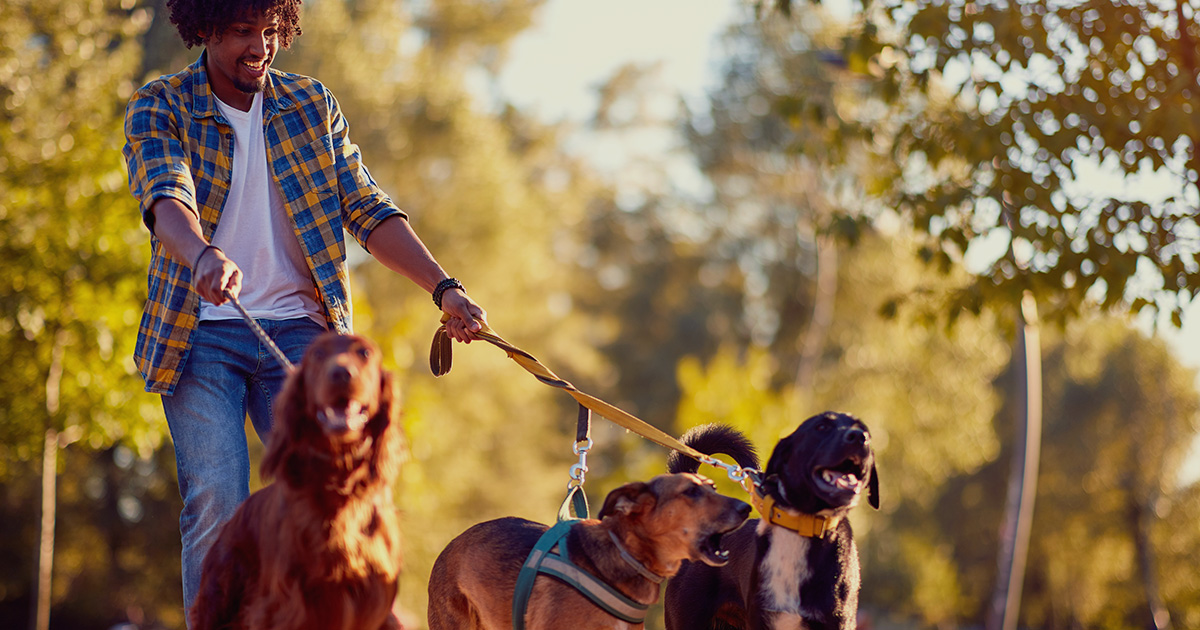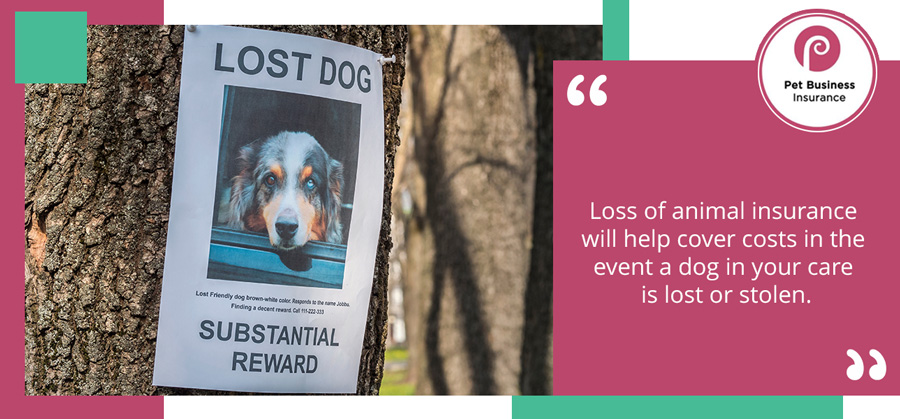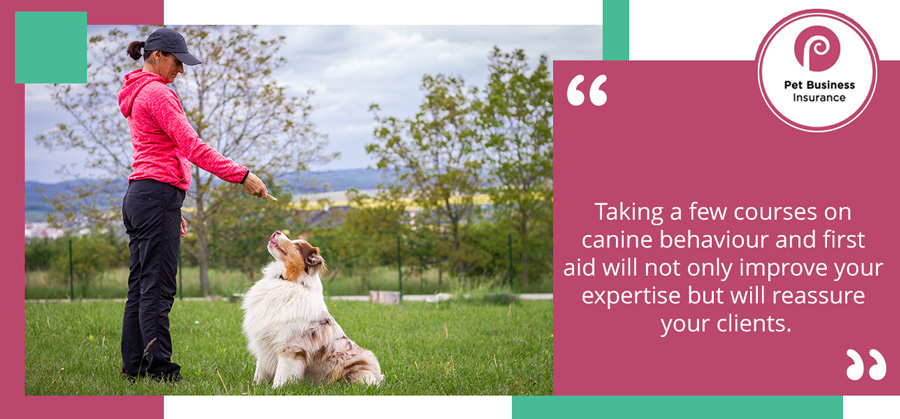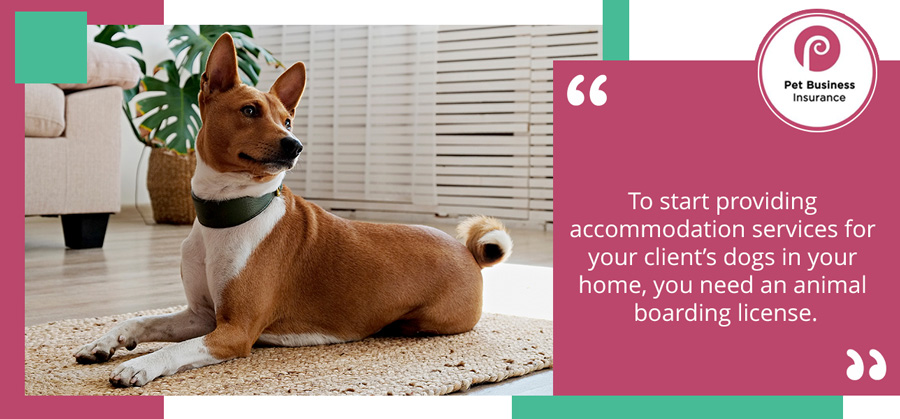
Are you looking for info on how to start a dog walking business? Becoming a dog walker is undoubtedly a viable business venture to consider if you’re passionate about dogs.
Not only is dog walking in high demand, but the business also has a relatively low barrier to entry and is highly profitable, although it does come with its own risks. If you are searching for a profitable recession-proof venture going into 2023 and beyond, give dog walking some serious consideration.
Why Start A Dog Walking Business
Despite the recent coronavirus pandemic, it's clear that Brits haven't lost their appetite for pet products. A recent study shows Brits spent over £9 billion on pet-related products in 2021. The figures are expected to increase in 2023, in line with the drastic rise in pet ownership across the country since 2020.
These numbers are a strong indication that dog walkers are in high demand right now. Mainly because many people have returned to work in offices and have to leave their pets at home. There will also be increased demand for dog walking services over the summer months, while owners are away on holiday.
If you're genuinely passionate about dogs, then this may be the perfect business to start today.
Research Your Market
To become a successful dog walker, it is important to carefully research your market to understand which dog walking services are in demand. You can use the internet to research your competition and find out where the gaps are.
Typical questions to ask when assessing the market can include:
- Which areas do most dog walkers cover?
- What is the hourly rate of most dog walkers in my area?
- Are group walks in demand?
- What facilities are available? (Public parks, green spaces, and parking)
On of the fastest ways to find actionable advice on how to become a dog walker is to speak with local dog walkers. Most dog walkers are usually friendly and readily available for a chat, so you can take advantage of their experience and knowledge that may be valuable to your business. This is especially true if you seek feedback in an area you’re not planning to cover.
Calculate Startup Costs
Dog walking has some of the lowest startup costs out there. Dog walking insurance, registration and marketing are some of the expenses you'll incur as startup costs. Of all these expenses, it's marketing that takes up a considerable portion of your startup costs. Although you can also find inexpensive ways to market your business, and still be effective in attracting clients. Here are the primary expenditures you need to know at the beginning of establishing a dog walking business.
Dog Walking Insurance
It’s important to get appropriate dog walking insurance for your business. As an absolute minimum, your insurance plan should include:
- public liability insurance
- animal accidents and injury insurance
- loss of animal cover
Public liability insurance protects you if something your business does causes harm to someone or damages their property. Accidents and injury insurance will cover dogs in your care for any accidents or injuries that may occur. Loss of animal insurance will help cover costs in the event a dog in your care is lost or stolen.
There may be other things you should consider insuring against depending on how you operate, such as loss of keys (belonging to a client), or theft of your business equipment. If you employ someone (even if they help you out for free) you will need employers’ liability insurance.
Expect to pay around £80 to £150 per year on insurance. If you are not sure what kinds of insurance you need, speak with a reputable pet business insurer.

Criminal background check
Although not compulsory, this is one of those costs you cannot avoid if you want to grow your clientele. You should also get yourself DBS checked. This is a criminal records check, which you can apply for online. This is important for potential clients, who don’t know you and with whom you will need to build trust.
Expect to spend around £18 to acquire a standard DBS check.
Marketing
Having an online presence for your dog walking business is essential to reach your target audience. Thid includes:
- Having a professional website
- Optimising your website for search engines
- Promoting your dog walking business with paid ads
- Keeping your blog active
- Being a member of the main professional dog walking directories on the internet
- Posting on the top social media platforms such as Facebook, Twitter and Instagram
- Some local Facebook groups allow small businesses to advertise so can be an effective way to reach local dog owners
Distributing flyers and business cards is also an effective way to target clients locally. On average you can print 5,000 flyers for around £100. If you own a van, some business branding, such as van livery with your business name and contact details is also an effective way to promote your business.
Having profiles on key business directories like Yelp can help create trust with your customers. If you have positive customer reviews on such sites, you'll undoubtedly gain the confidence of people, and that means getting more clients for your business.
Equipment
While you won’t need a lot of equipment, you will probably need a van suitable for transporting multiple dogs in. You should also think about how you are going to take bookings and payments. There is software available that can do this, and it doesn’t have to be expensive.
Some good walking shoes, spare leads and collars, dog treats, plenty of poo bags and proper outdoor wear (suitable for all weathers) are also requirements. In addition, consider whether you’ll need to have water and bowls in your van (if you have one) and old towels for drying off wet dogs.
Personalized dog walking gear can increase your visibility. Clothing such as waterproof winter parka, embroidered gilets, windbreakers, and hats are what you need to brand yourself as a professional dog walker. Expect to spend around £30 to £35 for professional quality gear.
Gain Skills and Experience
You don’t need formal training or qualifications to become a dog walker. However, it is important to have experience of handling dogs – not only for your safety and peace of mind, but also for your potential clients and their dogs.
Remember that dogs vary in size and temperament. You will need to understand canine behaviour and management, especially if you are walking more than one dog at a time.
At the start you can offer your services for free to gain some hands-on experience.
Taking a few courses on canine behaviour and first aid will not only improve your expertise but will reassure your clients that their dog is in safe hands. City & Guilds offer a range of level 2 and level 3 dog walking and pet care courses for around £30. Furthermore, the British College of Canine Studies provide a comprehensive Dog Walkers & Sitters Association certificate course for £129 and includes behaviour training, dog law and canine first aid.

Register Your Business
You can register your business with HMRC either as a sole trader, company, or partnership when starting a dog walking business. If you opt to register as a sole trader, you will be personally responsible for the debts incurred by your business. A limited company, on the other hand, shields you from being individually culpable of any liabilities in your business. As your company finances are separate from your personal funds. If you are unsure about starting a formal business, visit the official UK government website to learn more.
Know the Rules and Regulations
Adhering to the rules and regulations set by the UK government is essential if planning to start a dog walking business. If you don’t follow the rules to the latter, you could see your license cancelled.
The National Association of Petsitters and Dog Walkers, commonly referred to as NarpsUK, can help you know the rules and regulations the government wants you to follow. They also offer advice on how to start a dog walking business. Some of the rules you'll you need to know as a dog walker includes:
- Rules on meeting dog owners before the initial booking
- Restrictions on the number of dogs you can walk at a time
- Procedures for recording all work done
- Protecting customers personal information
- Ensuring dogs wear collars with the address and name of the owner
- Cleaning up dog poop to avoid hefty fines
Get Animal Boarding License
To start providing accommodation services for your client’s dogs in your home, you need an animal boarding license, and or pet sitting insurance if you wish to look after your clients' pets on their premises. Expect to pay around £300 to cover everything from start to finish, even though the prices can vary depending on location.
Alternatively, if you wanted to take things up a notch and make housing dogs a bigger part of your revenue stream you could consider setting up a dog kennel business.

Decide Your Pricing
On average most dog walkers in the UK earn between £10 to £20 per hour. Undoubtedly, your rates will vary depending on the location and the number of dogs you can walk at a time. Factors such as how many hours you're going to work, how much your competitors charge, your location, how many dogs you can walk at ago have a huge say on your hourly pricing.
Find Means of Transport
Based on the area to be covered, you may require reliable transportation to move dogs from one point to another. To use your car as a means of transportation, you'll have to adjust your insurance cover so that it works for your business. In addition, you'll have to gauge the size of your boot before you start transporting many dogs at once. In some cases, you may need to rent or buy a van if the number of dogs under your care increase.
Prepare Forms and Contracts
Having the right paperwork is essential if you are running pooch walking business. Dog walker should have contracts and forms to help avoid stressful scenarios that can occur when dealing with clients. Some of the forms you’ll get accustomed to as dog walker during your day-to-day dealings include booking forms, essential release forms, veterinary release, etc.
Niche down
Dog walking is a popular and lucrative business idea. However, you have to be selective about the market you go after in order to find success. To find success in your market try doing things differently.
For example, positioning yourself as a dog walker who specializes in walking and caring for a specific breed of dogs, like bulldogs can pay off handsomely. Because dog owners with bulldogs will likely hire your dog walking services. In short, picking a small niche and sticking with it is the best way to break ground and start getting clients fast.
Reliable dog walking insurance providers
Finding an insurer you can trust, and who understands your business, is an important element when deciding on dog walking insurance.
As specialists in the provision of insurance to pet businesses for almost 20 years, you can be certain the service you receive from Pet Business Insurance is tried and tested, and that we understand your dog walking business needs.
To discuss your insurance requirements, get in touch with Pet Business Insurance today. Call 01284 736 874, or complete our online quote form.
Wrapping up
Starting a successful dog walking business can be your way to financial freedom. With low startup costs and high demand, this is a perfect business opportunity to start if you live in the UK. Use all the tips above to start a thriving dog walking venture today.